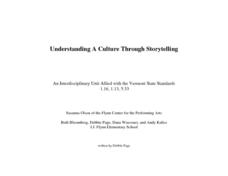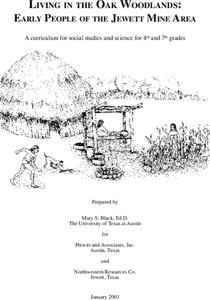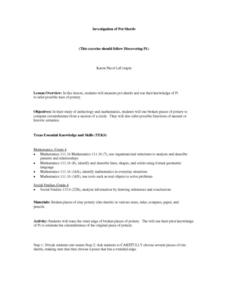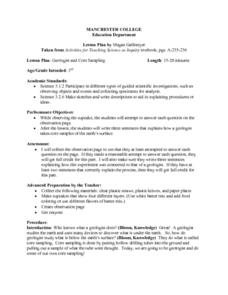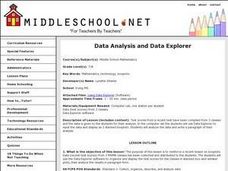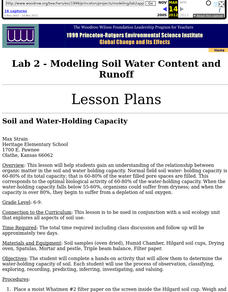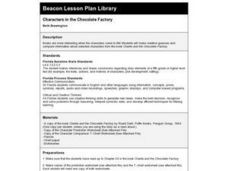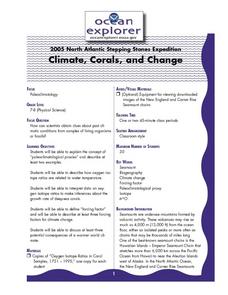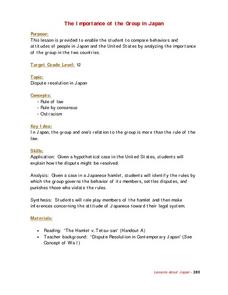Curated OER
Understanding A Culture Through Storytelling
Students explore Japanese folk tales and create a performance that tells one of the Japanese folk stories.
Curated OER
African-American History and Culture in the English Classroom
Ninth graders identify and recognize characteristics of nonfiction in literary works, explore language and culture of Gullah people, compare and contrast purposes of spirituals and quilts in terms of their relationships to escape from...
Curated OER
Hatching Brine shrimp
Second graders investigate the life cycle using brine shrimp as an example. They conduct observations by watching the shrimp hatch out of cysts. Students design simple experiment to structure an observation. The experiment is approved...
Curated OER
Planet Picking
Students arrange the planets according to their distances from the sun. In this astronomy lesson, students list interesting properties about each planet. They identify an unknown planet photo.
Curated OER
Crossing China By Sampan
Sixth graders determine the geographic features that facilitate and prevent communication and commerce between parts of China. They recognize a sampan, the traditional flat-bottomed boat used in Southeast Asia.
Curated OER
The Time I Got Lost
Third graders go through the writing process but substitute paper and pencil with the computer to create a story about "The Time I Got Lost".
Curated OER
Acid Rain: An Air Pollutant
Fifth graders participate in an experiment in which they examine the effects of acid rain on buildings. They discover how huge a problem acid rain is not only to structures but to the environment. They gather pictures of acid rain to...
Curated OER
Living in the Oak Woodlands: Early People of the Jewett Mine Area
Students examine the archeology and native peoples of the Jewett Mine area of Texas. Using a map, they explain the economic patterns of the native groups and how the geography of the area affected activities. They compare and contrast...
Curated OER
Investigation of Pot Sherds
Fourth graders review their prior knowledge on the concept of pi. Using broken pieces of pottery, they calculate the circumference from a section of the circle. In teams, they compete against one another to get the most accurate...
Curated OER
Geologist and Core Sampling
Third graders observe a cupcake and attempt to answer each question on the observation page. They write three sentences that explains how a geologist takes core samples of the earth's surface. Students make sketches and write...
Curated OER
Yaba "Data" Cereal
Fifth graders create and modify a database using information from cereal labels.
Curated OER
Data Analysis and Data Explorer
Students use the Data Explorer software to organize and display the test scores for the classes in stacked box-and-whisker plots, then analyze the results in paragraph form.
Curated OER
Kissing Coyotes
Fourth graders are read the book "Kissing Coyotes". During the story, they make predictions about what they believe might happen next. After the story, they create their own story using their imagination and draw illustrations.
Curated OER
Permeability of Earth Materials
Students observe and classify the permeability of a variety of materials.
Curated OER
Drawing Conclusions
Middle schoolers play a probability game, then design and complete a probability problem concerning changing odds.
Curated OER
From Home to Nome
Third graders develop and create an electronic portfolio on their hometown, school, and themselves to send to a school on the Iditarod Trail. They gather information from the Internet, printed materials, and a digital camera.
Curated OER
Maverick
Young scholars apply probability to real life situation. For this statistics lesson, students play poker and make predictions on what hand they will get next. They apply their knowledge of how probability works to make their predictions.
Curated OER
Cycles Review
Eighth graders discuss the four major cycles of matter. In this general science lesson, 8th graders decide which of the four is the most important. They share their opinion in class.
Curated OER
Can You See It, Touch It, Hear It?
Students develop and practice observational skills through lab activity.
Curated OER
Characters in the Chocolate Factory
Students dress and act as selected characters from Roald Dahl's "Charlie and the Chocolate Factory". They identify each other and make predictions about the upcoming chapters based on their observations about the characters.
Curated OER
Comparing Amount of Rainfall in Different Geographical Areas
Students construct rain gauges and use them to log rainfall in their school zone, local city, and region and then compare and discuss them by plotting this information.
Curated OER
Climate, Corals, and Change
Pupils examine oxygen isotope ratios and how they are related to water temperature. They also identify three forcing factor changes for climate change.
Curated OER
Exhibiting Your Knowledge
Young scholars are introduced to the various museum functions. In groups, they create a traveling exhibition based on Gutenberg's invention and the first printed book. They share their exhibition with the class and answer any questions...
Curated OER
The Importance of the Group in Japan
Twelfth graders discuss the importance of the group in Japan. In groups, they compare and contrast behaviors and attitudes of those in Japan and the United States. They are given a case to review and identify the rules by which the...


